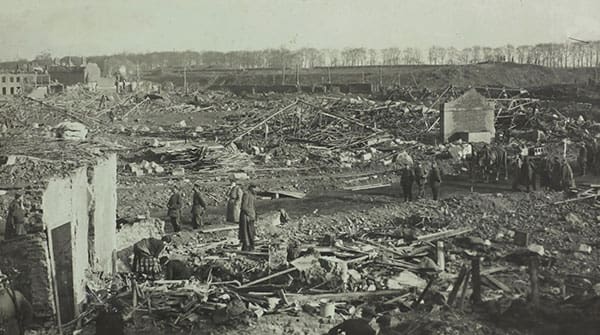U.S. President Dwight D. Eisenhower was right when he warned of the dangers of the military-industrial complex and excessive military spending
 “Ninety-nine years of war leaves no place for a winner.”
“Ninety-nine years of war leaves no place for a winner.”
This is the first line in the final stanza of the 1980s hit “99 Luftballons” by the German band Nena. It is a concept not conveyed in the English version of the song called “99 Red Balloons”. It is also a concept not understood by much of the world.
Wars not only cause tremendous suffering and death; they also destroy empires, sometimes even when the war is won. Though France successfully contributed to the defeat of their enemy Great Britain in the American War of Independence, the economic strain it caused became a factor leading to the French Revolution. Even though Great Britain won both World Wars, it lost the geopolitical influence it had enjoyed in the 19th century, and it is now a simple island nation struggling to support the wealth of its upper class while maintaining social order.
The United States emerged from the Second World War as the most dominant economy in the world. Its manufacturing sector had led them to victory; the U.S. dollar then financed the reconstruction of the countries destroyed by war. For the remainder of the century, the U.S. dollar remained the legal tender of choice worldwide.
Trust in the American currency has diminished over time, resulting in what is referred to as de-dollarization. American economist Richard Wolff points out that while the U.S. dollar was once the gold standard of international finance, today, only about 40 percent of the reserves held by central banks around the world are in U.S. dollars.
Recent global events have accelerated this phenomenon. The decision by the Americans to economically sanction Russia and block it from their financial system has resulted in greater trade between Russia, China, India, and many other countries using currencies other than the U.S. dollar. Saudi Arabia once accepted payments for oil only in U.S. dollars, but their decision to accept payment in the Chinese yuan has further weakened the influence of the American currency.
Social commentators have been discussing the decline of the American Empire for decades, and it is becoming more and more difficult to deny this reality. We often forget, however, that all empires rise and fall. We also forget that an empire can have a relatively soft landing, as Great Britain did when they were replaced by the United States.
We don’t know what will replace the American Empire. Many speculate it will be China, but declining birth rates, a slowing economy, and numerous other factors could diminish China’s influence. We could end up with a multi-polar global economy with several larger countries having a strong influence.
We could also continue to increase military spending, destroying the environment and ourselves by trying to destroy one another. However, there are other options.
What does all of this mean for a country like Canada? First, like a true friend, we need to challenge the United States when we see them destroying themselves. We can stop supporting their misguided foreign policy, and this begins by insisting on a negotiated settlement to the war in Ukraine.
We must also take steps to prepare our citizenry for potential changes in the global economy. The best way to do that is to not only provide technical training but teach our children to believe in themselves while challenging them with diverse worldviews. We need critical thinkers who understand that the greatest investments they can make are in their own self-improvement and their neighbours’ success.
In his final address to the American people before leaving office in 1961, President Dwight D. Eisenhower warned of the dangers of the increasing influence of the military-industrial complex on his country. His words now seem prophetic.
There are no winners in war or in excessive military spending.
Gerry Chidiac specializes in languages, genocide studies and works with at-risk students. He is the recipient of an award from the Vancouver Holocaust Education Centre for excellence in teaching about the Holocaust.
For interview requests, click here.
The opinions expressed by our columnists and contributors are theirs alone and do not inherently or expressly reflect the views of our publication.
© Troy Media
Troy Media is an editorial content provider to media outlets and its own hosted community news outlets across Canada.


